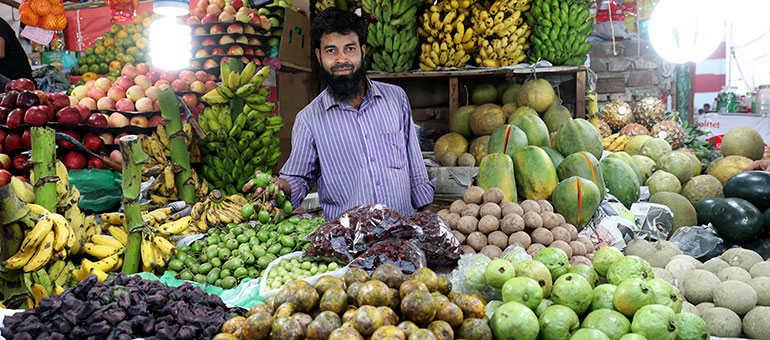Mayors and concerned urbanites gathered in Bonn last week at the 9th Global Forum on Urban Resilience and Adaptation. They spent a fair bit of the second day of their meeting talking about food systems. The big question: does the city of the future lead us inexorably towards unhealthy diets and unsustainable models of production and waste, or is there a better way?
The challenges look daunting. The mayor of Quelimane, a coastal city in Mozambique, told the audience how his city is built on a mangrove swamp which protects the city from flooding and provides a fertile breeding ground for fish. But cutting down the mangroves is almost irresistible for the urban poor, who need new space to build homes and use wood for fuel. And take Lusaka, Zambia, where, as in many other cities around the world, middlemen control the markets forcing up prices for nutritious foods like fruits and vegetables, making them even more unaffordable for the poor and more difficult for ordinary farmers to sell their produce in town. As a result, overweight and obesity, and the non-communicable diseases that this results in, represent a significant threat to growing urban populations.
But cities are also beacons of hope for many poor people around the world, and are as replete with opportunities as they are with risks. Most West African cities have virtually eliminated stunting, for example, even while their rural hinterlands continue to show high levels of undernutrition. Something is going right in these environments. And there is engagement from city governments to face these challenges and work together. How can we capitalise on the progress made, and make sure that undernutrition isn’t simply replaced with equally severe problems of obesity and non-communicable disease?

Man selling fruits and vegetables in an indoor market in Bangladesh. © GAIN
Saul Morris, Director of Programme Services at GAIN, was a panelist at the Bonn meeting, discussing proposals to take a systems approach to food security in the world’s cities, bringing together a wide range of food systems actors and identifying a common vision and specific opportunities for collaboration. GAIN is already working with other actors who could contribute to a better future for cities in the South: take the work with global retailer SPAR in South Africa, for example, to raise the quality of smallholder vegetable production and set up distribution hubs which can supply multiple outlets with safe, delicious, and reasonably priced fresh produce.
Likewise, in Nairobi, our partnership with Chicken Choice has made safe, affordable poultry meat available in many poor neighbourhoods where previously it was only possible to buy whole chicken carcasses - an unaffordable luxury for the poor. Our recently launched work programme on urban food governance for nutrition will complement these projects on the ground by trying to improve the structures and accountability mechanisms that best support good nutrition in cities. Accountability mechanisms like Bogotá’s Bogotá Cómo Vamos, which brings together a local foundation, a newspaper, a university, and the urban Chamber of Commerce, to lay out a shared vision for the city’s future, track progress towards that end, and hold councillors to account for their voting and actions, are a source of inspiration. Something similar could hopefully be achieved by local food councils or other governance mechanisms.
The urban food system community is blessed with strong and committed partners. ICLEI is a global network of more than 1500 cities, towns, and regions, offering an incredible pathway to scale once good models have been identified. The "Food for the Cities Programme", a partnership between the UN Food and Agriculture Organization (FAO) and the RUAF Foundation has made a great start at designing food systems diagnostics tools and piloting solutions.
GAIN is committed to bringing in a tight focus on nutrition. By working together, we hope that the future cities of Africa and Asia will not look so much like Gotham City but rather more like the 2017 World Sustainable Food Capital, Valencia and other global examples of healthy living.